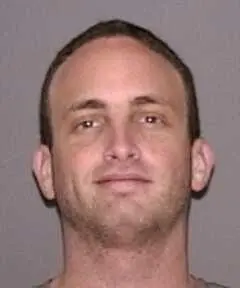Long Island Drug Dealer Freed by Donald Trump Now Convicted of Molesting His Children’s Nanny and Assaulting a Toddler — Faces 27-Month Prison Sentence
Jonathan Braun, a Long Island drug dealer once granted clemency by former President Donald Trump, has once again found himself behind bars — this time for crimes that are even more disturbing than his past offenses. Braun, 41, was convicted in Brooklyn federal court of sexually abusing his children’s nanny and assaulting a toddler, just three years after Trump commuted his 10-year sentence for a massive marijuana trafficking operation. The new conviction marks a shocking downfall for a man who had once counted on a presidential act of mercy to rebuild his life.

According to prosecutors, Braun’s second chance at freedom quickly spiraled into a nightmare for those around him. In 2021, Trump’s pardon released him early from federal prison, where he had served less than half of his original sentence for orchestrating one of the largest marijuana smuggling operations in New York history. At the time, Braun’s commutation was quietly celebrated by his supporters, who described him as a family man ready to start over. But that image has now collapsed in the wake of horrifying revelations about what happened after his release.
Court documents reveal that Braun began displaying predatory behavior toward his family’s nanny shortly after being freed. The woman, whose name has not been made public, told investigators that Braun repeatedly harassed her and eventually sexually assaulted her while she was caring for his children at his Long Island home. In a separate incident, he was accused of assaulting a toddler during one of the nanny’s caretaking shifts. The allegations led to a federal investigation that culminated in Braun’s arrest earlier this year and his conviction this week.
During the sentencing hearing in Brooklyn, prosecutors described Braun’s conduct as “predatory, manipulative, and cruel,” adding that he had used his position of trust and power to exploit those who were most vulnerable. The judge agreed, sentencing Braun to 27 months in prison and ordering him to undergo mandatory psychiatric and behavioral treatment while incarcerated. The court also found that his actions violated the terms of his 2021 pardon, which had stipulated that he must remain law-abiding following his release.

For many, the case has reignited debate over Trump’s controversial use of presidential pardons during his final days in office. Braun’s name appeared on a list of 143 people granted clemency or commutation by Trump in January 2021, alongside political allies, celebrities, and figures from Trump’s social circle. While some recipients had demonstrated efforts at rehabilitation, others — like Braun — were granted clemency despite ongoing investigations or troubling backgrounds.
At the time of his release, Braun had already established himself as a polarizing figure in the New York area. Federal prosecutors once labeled him a “predatory lender” and accused him of running a violent loan-sharking operation that targeted small businesses. According to earlier court filings, Braun’s lending firm, Richmond Capital Group, charged sky-high interest rates and allegedly used threats of violence to collect debts. Though he was never formally charged in connection with those allegations, his reputation as a ruthless enforcer followed him long after his release from prison.
Following Trump’s commutation, Braun appeared eager to craft a new public image. He was photographed several times at Trump’s Mar-a-Lago resort and golf courses, smiling alongside the former president and wearing designer clothing. Those images, which circulated widely on social media, painted a picture of a man grateful for his second chance and connected to powerful allies. But prosecutors now say that behind the scenes, Braun’s personal life was unraveling — and his behavior toward the nanny suggested that he had returned to a pattern of manipulation and abuse.
In their closing arguments, prosecutors said Braun’s crimes showed “a total lack of remorse and a continuing belief that he was above the law.” One of the prosecutors, Assistant U.S. Attorney Emily Cordova, told the court, “Jonathan Braun was given an extraordinary gift — freedom — and he repaid that act of clemency with violence and exploitation. He has proven himself incapable of change.”
The defense attempted to portray Braun as a man struggling with addiction and mental health issues who made “terrible mistakes” but did not intend to harm anyone. His attorney argued that Braun’s time in prison had left him emotionally unstable and that he had been “under immense stress” trying to rebuild his life and family after years behind bars. But the judge was unmoved, emphasizing the severity of the crimes and the need for accountability.
When given the opportunity to speak before his sentencing, Braun reportedly addressed the court in a subdued tone, acknowledging his “many failures” but stopping short of admitting guilt. “I’ve made mistakes,” he said, “and I’m deeply sorry for the pain I’ve caused. I only want to move forward and become a better man.” His apology did little to sway the court or the victims’ families, who described his words as hollow.
Outside the courtroom, reactions to Braun’s sentencing have been intense. Critics of Trump’s pardons quickly pointed to the case as evidence of how political favoritism can lead to disastrous consequences. “This is exactly why presidential clemency should never be used as a personal favor,” one legal analyst commented. “When individuals with violent or exploitative pasts are released prematurely, the risk to the public increases dramatically.”
Supporters of the former president, meanwhile, have argued that Trump cannot be held responsible for Braun’s later actions, noting that no one could have predicted his future crimes. “Every president has granted pardons that later proved regrettable,” said one political commentator. “But that doesn’t mean the system itself is broken.”
For the victims, however, the focus remains on justice and healing. The nanny who testified against Braun described her experience in court as “terrifying,” saying she had lived in fear for months after the assaults. “I thought he would ruin my life if I told anyone,” she said in her victim statement. “But I couldn’t stay silent anymore. He doesn’t deserve another chance.”
The case has also sparked renewed scrutiny of how individuals with criminal histories are monitored after receiving federal clemency. Experts note that presidential pardons, unlike standard parole or probation, do not always come with long-term oversight mechanisms. Once an individual is freed, federal authorities have limited tools to track their behavior unless they commit new offenses. “It’s a loophole in the system,” said a former Justice Department official. “Someone can be released by presidential decree and essentially disappear from supervision. That’s how cases like this happen.”
Braun’s downfall marks a dramatic turn from the lavish lifestyle he flaunted in the years following his release. Photographs on social media showed him vacationing, attending luxury events, and networking with political figures. But those images now serve as haunting reminders of how quickly public redemption can dissolve into infamy.
Legal experts say Braun’s conviction could potentially open the door for the Justice Department to reexamine other controversial clemency recipients from Trump’s final hours in office. While each case is unique, prosecutors may look for patterns of post-release misconduct to determine whether further oversight is warranted.
As for Braun, his new 27-month sentence represents both punishment and a symbolic closure to a saga that began more than a decade ago. His initial crimes, which involved smuggling thousands of pounds of marijuana into the United States from Canada, made him a millionaire before his empire collapsed under federal investigation. His 2019 sentencing was initially considered lenient, given the scale of the operation. Now, with his recent conviction, even those earlier concessions appear undeserved.
Federal prosecutors concluded their case by emphasizing the broader message behind Braun’s sentencing: that privilege and connections cannot protect someone from the law forever. “This defendant was given the opportunity of a lifetime,” the prosecutor said. “He chose to throw it away. No amount of influence or wealth can erase what he’s done.”
As Braun returns to prison, the legacy of his crimes — both old and new — continues to reverberate across Long Island and beyond. For those who once believed in his rehabilitation, the news is a sobering reminder of how fragile redemption can be. And for the victims, his conviction represents a long-awaited moment of accountability, even if it cannot undo the harm he caused.


